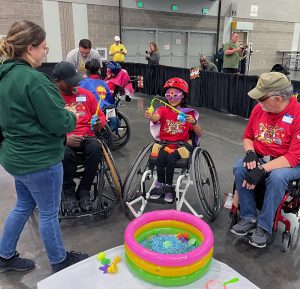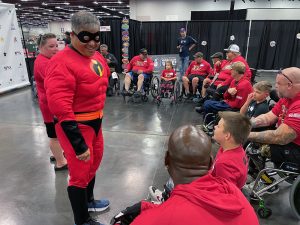Kids Day, in-person swimming competition return to NVWG
Seven young wheelchair users not only had the opportunity to meet real-life veteran heroes, but they also got to dress up like their favorite superhero characters and try out several adaptive sports during Saturday’s Kids Day at the 42nd National Veterans Wheelchair Games (NVWG) in Portland, Ore.
Kids Day made its return to the Games, co-sponsored by Paralyzed Veterans of America and the Department of Veterans Affairs, after a four-year hiatus during the novel coronavirus (COVID-19) pandemic. Kids were paired with NVWG athletes to receive coaching and mentorship in three activities: a kid-sized obstacle course, fishing with a magnetic pole and plastic fish in an inflatable pool and a two-hole disc golf course. All kids earned participation medals.
Ten-year-old Austin Justin and his mother, Tabitha Fich, drove from Vancouver, Wash., to attend Kids Day.

Justin, who has spinal muscular atrophy, says the event was fun and exciting, and he liked disc golf and the obstacle course the best. He’s played for the Portland Junior Wheelblazers wheelchair basketball team for two years and wanted to come to Kids Day because he’s trying to recruit some more players for the team.
Dressed as Iron Man, he blazed through the obstacle course as the crowd cheered and chanted his name. He says hearing the crowd made him want to go faster.
“It was really exciting, but I was kind of used to it already because on Junior Wheelblazers, we used to be able to go to [Portland] Trail Blazers’ games and play on that court at halftime, and that’s millions, thousands of fans,” Justin says. “So, I was kind of used to it, especially from that. And then I did track, so, in track, there’s lots of people, too.”
In addition to wheelchair basketball and track, he’s played sled hockey and baseball. He can walk with crutches, so he also wants to try soccer.
PVA Mid-Atlantic Chapter member Johnny Holland, who volunteered for Kids Day for the 15th or 16th year, was paired with Justin as his mentor. Holland likes seeing the excitement on the kids’ faces while they’re competing.
“The fact that they get be powerful for the day, it’s just encouraging to see the smiles on their face,” he says. “The kids, I’m sure they have it rough at school being in chairs, and just being able to get out and get away from that, it’s all about them.”
Fich says it’s important for the young athletes to be paired with veterans to possibly learn some new wisdom or advice.
“I think it was an amazing opportunity to see this and hear maybe about their stories and what they’re interested in, to maybe brighten their future and have an interest when they get older,” she says.
Nadine Vining, a 10-year-old who was adopted from China and born with a piece of her spine missing, also participated in Kids Day and says she liked fishing the best. She’s tried real fishing before and has played wheelchair tennis for two years.

Vining chose a Wonder Woman mask with a purple cape because she liked the color, and she enjoyed hearing the crowd chanting her name and cheering for her during the obstacle course and disc golf.
“It felt like people liked me,” she says.
She and her mother, Kara Vining, traveled from Stayton, Ore., for the event. Kara Vining liked watching her daughter compete in the obstacle course.
“I was thinking they probably could have doubled it and made a longer runway for her because she is a go-getter,” Kara Vining says. “She would probably want to do it about five times.”
Kara Vining says she felt like it was important for Nadine to be around everyone else in a wheelchair and feel like part of the community.
“There’s not a lot of opportunities for children who are in a wheelchair to participate in regular sports and honestly just her ability to participate at recess and the community activities and summer camp, so any chance we can get her out and experiencing what other kids get to experience, we do it,” Kara Vining says. “We set everything aside because she’s just like everybody else. She just wants to participate. She’s very athletic, too.”
NVWG athlete George Hamilton, who has a brain injury and doesn’t currently belong to a PVA chapter, was paired with Nadine and enjoyed his first time as a coach — and first time at the Games.
“That’s an amazing young woman,” the Tualatin, Ore., resident says of Nadine. “I love kids. I love doing things with kids and being part of programs for kids. They need an example that you can do anything.”
Another event that made its return to in-person competition this year was swimming, which Another event that made its return to in-person competition this year was swimming, which was held Saturday evening at Mt. Hood Community College Aquatics Center in Gresham, Ore.
PVA Mid-South Chapter member and Army veteran Ricky Moore competed in the 100-meter freestyle for the first time. He’s been coming to the Games since 2016 but only began training for swimming this year.. The 63-year-old served from 1979 to 1984 and sustained a level T9-T10 spinal-cord injury in 2015 from an infection on his spine.

“I used to swim when I was able-bodied, and me and my [recreational] therapist [Audrey Stott] were trying to find something that I could do,” says the Memphis resident. “And we tried a lot of things before we started swim therapy, and once I started swim therapy, I said, ‘This is what I like to do.’”
He competed in swimming for the NVWG At-Home last year but prefers swimming against other athletes outdoors and having an audience cheering for him.
“I like the competition,” Moore says. “It gives me a boost. It made me want to push on, and even though I was tired, hearing my name made me want to push that thing and go for more.”
Despite struggling to finish his laps and coming in last in his heat, he says he just enjoys being in the water.
“I do swim therapy and I do my exercises in the water,” Moore says. “Just being in the water, taking the weight away from me, allowing me to do more things, more exercises. Once I got in the water, I just loved the water. But I learned to swim before. It’s just being reintroduced to the water as this made it even better.”
Moore also competed in bowling, boccia, field events, disc golf and the cornhole exhibition. He looks forward to coming to the Games every year.
“I was active before I was injured, and when they introduced me to the wheelchair games, it was like a second breath,” he says. “It put an incentive in me that I thought I’d lost when I got injured.”



